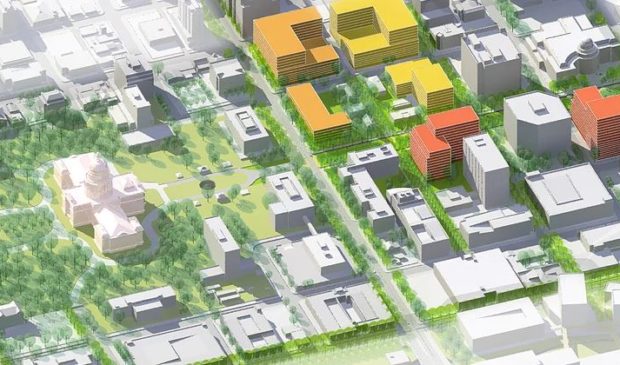Council greenlights new pedestrian mall on Congress Avenue
Friday, December 15, 2017 by
Jack Craver City Council paved the way Thursday for a major state project that will transform three blocks of downtown from roadway into a grass-covered pedestrian mall.
Council voted to give the Texas Facilities Commission the OK to seize control of city right of way on Congress Avenue between 16th Street and Martin Luther King Jr. Boulevard to construct the “Texas Mall” and the underground parking garage underneath.
The mall is the centerpiece of phase one of the Texas Capitol Complex Master Plan. The plan will also include two new state buildings on Congress Avenue that are expected to serve 3,500 state employees who currently work in leased office space elsewhere in the Austin area. Phase one of the plan will cost $581 million, over $100 million of which will be spent on the mall and parking garage.
The state’s website for the master plan describes the future mall as a “tree-lined, pedestrian-oriented civic event space” that “will serve as a cultural gateway” between the Capitol and a new “museum district” comprising the existing Blanton Museum of Art, the Bullock Texas State History Museum and a yet-to-be-determined future cultural facility.
“It’s going to be an iconic space for everybody to enjoy,” said Peter Maass, deputy executive director of planning and real estate management at the Texas Facilities Commission, who has been coordinating with city officials on the project.
The vision for a centralized location for state office buildings united by a mall has been around since the 1950s, said Maass. Nearly 60 years later, he said, “we’re finally making it happen.”
While no Council members criticized the concept of the mall itself, bitterness over Gov. Greg Abbott’s repeated snubs of the city – some rhetorical, some legislative – made it hard for some to vote in favor of cooperation with what they view as a hostile state government.
In justifying her decision to abstain from the vote, Council Member Leslie Pool cited the bad blood between the city and state as well as unanswered questions about a mysterious state-city “ledger,” on which everything of value the city has ever given the state, from a property to a fee waiver, is accounted.
City staff has estimated that if the state were charged the standard rate for use of city right of way, it would owe roughly $6.8 million.
“It’s a protest vote,” said Pool, describing her abstention. “It’s a small message but I have to remain true to my values on this one.”
It remains unclear what purpose the ledger serves and whether the city will ever receive the money listed on it, although there is talk of an effort by Austin-area legislators introducing a bill in the next legislative session that would result in the city getting compensated in some way. However, considering the bad blood between Austin and the state’s Republican leadership, expectations of passage aren’t high.
“The money on this ledger to me is akin to Monopoly money,” said Council Member Ora Houston, in whose district the affected area is located. “We may not have a bill filed in my lifetime that says the city has the right to use this.”
Houston also reiterated concerns she has expressed about the impact the project will have on traffic.
Not only will the mall take away roadway, but the relocation of state workers downtown means more people will be driving on the parts of Congress Avenue that remain.
Council Member Jimmy Flannigan said that he was initially concerned about the cost the city was absorbing from fee waivers, but his investigation of the issue left him reassured. The city is not actually losing money from the deal, he said, but rather giving up right of way for an amenity that it will now benefit from.
City Development Services Director Rodney Gonzales also confirmed that while the state is getting the right of way for free, it will reimburse the city for any review time that city staff spends on the project.
The motion to authorize the fee waivers and enter into the interlocal agreement with the Texas Facilities Commission passed 9-1-1, with Pool abstaining and Houston opposing.
State Sen. Kirk Watson, D-Austin, released a statement heralding the future mall.
“The city and state often disagree on policy,” he said, “but this is a perfect example of how they can work together to benefit the Texans we all serve.”
Maass said that construction of the mall, and the resulting closure of parts of Congress Avenue, will probably take place next fall. The first phase of the overall master plan, however, is not slated to be complete until 2022.
Rendering courtesy of the state of Texas Capitol Complex Master Plan.
The Austin Monitor’s work is made possible by donations from the community. Though our reporting covers donors from time to time, we are careful to keep business and editorial efforts separate while maintaining transparency. A complete list of donors is available here, and our code of ethics is explained here.
You're a community leader
And we’re honored you look to us for serious, in-depth news. You know a strong community needs local and dedicated watchdog reporting. We’re here for you and that won’t change. Now will you take the powerful next step and support our nonprofit news organization?




